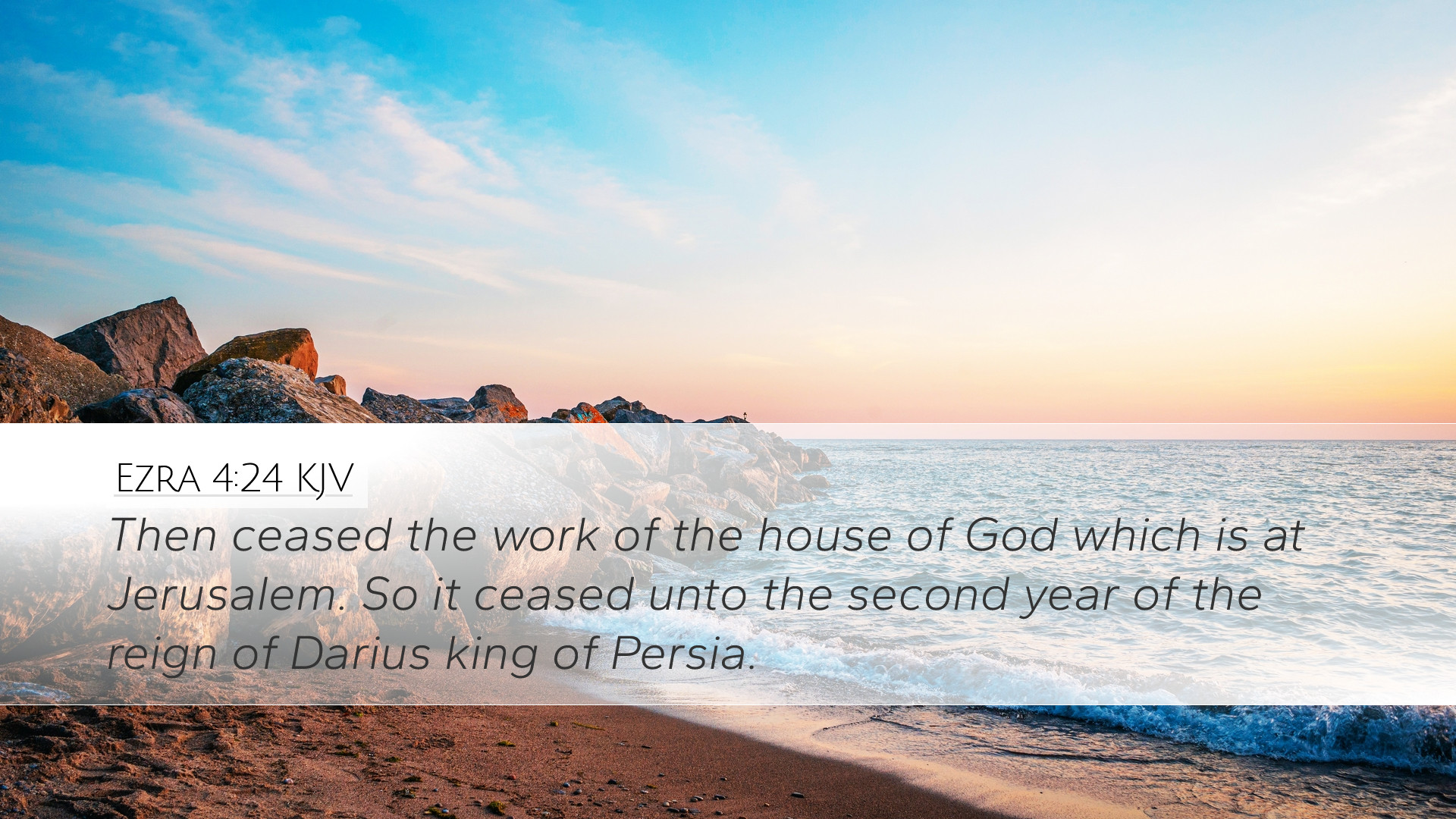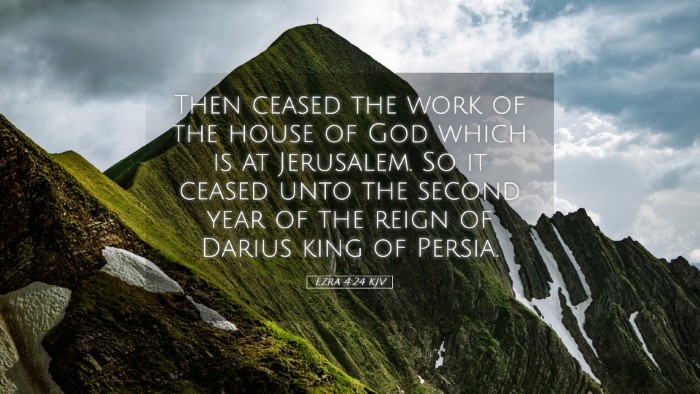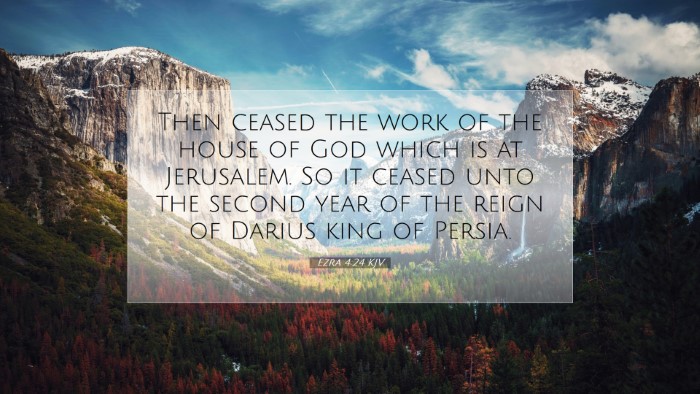Old Testament
Genesis Exodus Leviticus Numbers Deuteronomy Joshua Judges Ruth 1 Samuel 2 Samuel 1 Kings 2 Kings 1 Chronicles 2 Chronicles Ezra Nehemiah Esther Job Psalms Proverbs Ecclesiastes Song of Solomon Isaiah Jeremiah Lamentations Ezekiel Daniel Hosea Joel Amos Obadiah Jonah Micah Nahum Habakkuk Zephaniah Haggai Zechariah MalachiEzra 4:24
Ezra 4:24 KJV
Then ceased the work of the house of God which is at Jerusalem. So it ceased unto the second year of the reign of Darius king of Persia.
Ezra 4:24 Bible Commentary
Commentary on Ezra 4:24
Verse Context: Ezra 4:24 states, "Then ceased the work of the house of God which is at Jerusalem. So it ceased unto the second year of the reign of Darius king of Persia." This moment highlights a significant pause in the rebuilding of the temple, impacting the Jewish community deeply, both spiritually and physically.
Historical Background
The context of this verse lies within the narrative of the post-exilic return of the Jewish people to Jerusalem. After the decree of Cyrus which allowed the Jews to return and rebuild the temple, opposition from surrounding nations arose under Artaxerxes, leading to a cessation of building activities.
Historically, this cessation indicates not only the challenges faced by the Jews upon their return but also serves as a reflection of the spiritual state of the people, who at times allowed external pressures to lead them away from their divine mandate.
Theological Insights
This verse serves as a reminder of God's sovereignty and the importance of perseverance in faith. Despite the halting of the temple construction, God remains in control. The cessation of work can symbolize the trials believers face when they endeavor to follow God's commands in a world filled with opposition.
- The Persistence of God’s Plan: Even when human efforts seem thwarted, God’s ultimate plan unfolds in His time and according to His will.
- The Role of Opposition: Opposition should be expected in the life of a believer. It often serves to purify the faithful and challenge their resolve.
- Restoration and Hope: The period of silence culminates in restoration. This narrative builds anticipation for the eventual revival in temple worship.
Commentary by Matthew Henry
Henry emphasizes the seriousness of the opposition faced by the Jewish returnees. He notes that the work ceasing for those two years illustrates the trials believers often encounter when striving for obedience to God's directives. He writes, “The adversaries of the Jews were successful for a time, but their triumph was intended to be temporary.” God is still present, even in apparent inactivity.
Commentary by Albert Barnes
Barnes draws attention to the political intricacies involved. He discusses how a political maneuver by the opponents of the Jews led to the decision made by the Persian king that halted construction. Barnes argues that the believers must recognize that these diversions are sometimes permitted by God for purposes beyond immediate human comprehension.
He also asserts the importance of faithfulness amidst adversity, drawing from this verse the principle that “perseverance in spiritual endeavors is to be kept even in the face of opposition.”
Commentary by Adam Clarke
Clarke elaborates on the spiritual implications of the verse, suggesting that this pause in construction can be viewed as both a judgment and an opportunity for reflection. He states, “The people of Israel were in danger of being discouraged, but it was a moment to gather strength.” He reminds readers that during moments of difficulty and delay, believers can turn inward for spiritual growth, waiting for God's timing of restoration.
Clarke further emphasizes the ultimate significance of the temple as a representation of God’s presence among His people, encouraging them to reclaim their identity through worship.
Application for Today
This passage continues to resonate with modern believers facing their own challenges. Here are some applications:
- Understanding God's Timing: Just as the Jews faced delays, believers must cultivate trust in God's timing, knowing His plans often unfold differently than expected.
- Embracing Trials: Oppression can serve as a catalyst for growth. Believers are encouraged to view their struggles as opportunities for deeper faith and resilience.
- Community Support: The cessation of the temple work also emphasizes the importance of community in the faith journey. Support among believers can strengthen resolve in the face of adversity.
- Future Restoration: Just as the temple was eventually rebuilt, there is always hope for restoration in spiritual and communal practices in the life of the church.
Conclusion
Ezra 4:24 serves as a vital lesson about the complexities of faith amidst trials. It reflects the challenges that believers throughout history have faced, being encouraged to remain steadfast. The insights from Matthew Henry, Albert Barnes, and Adam Clarke shed light on this verse’s rich theological implications. As believers reflect on the lessons within this passage, they are urged to look to God for strength, to persevere in faith, and to anticipate the unfolding of His redemptive purposes in their lives.


